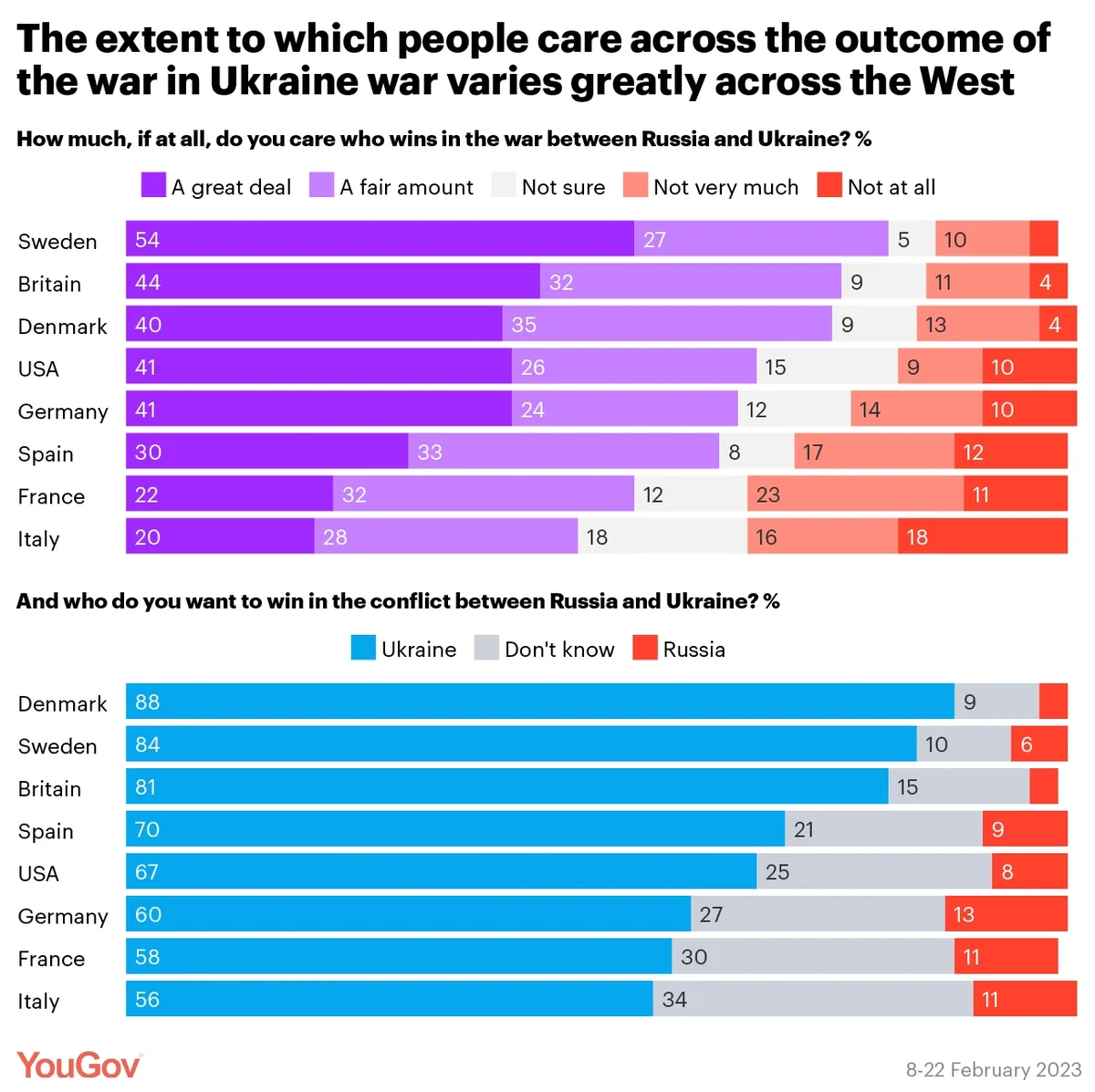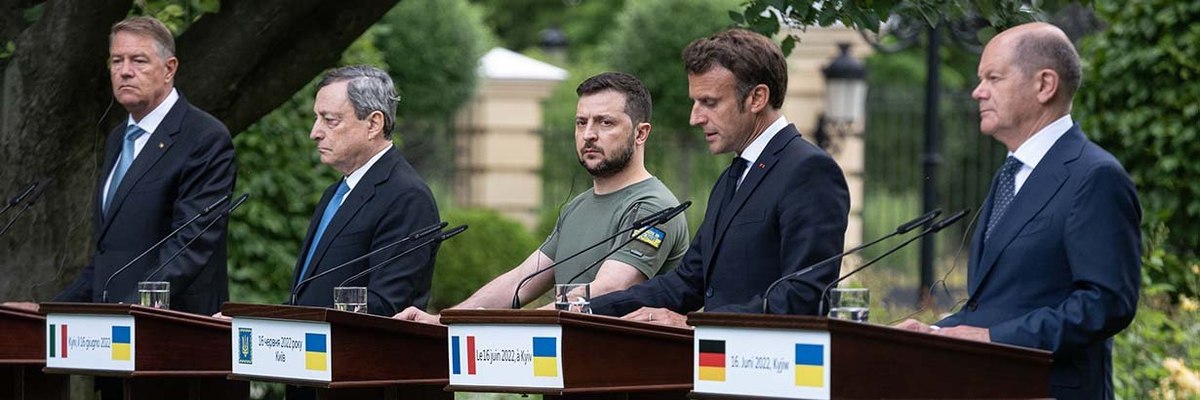Nations are at odds over peace negotiations
With today marking the first anniversary of the Russian invasion of Ukraine, a new YouGov Eurotrack and accompanying US survey reveals that Western publics are at odds on some key issues surrounding the war.
One year into the war, should the West encourage negotiations or support Ukraine until Russia quits?
At the Munich Security Conference this weekend British prime minister Rishi Sunak made clear that the West’s approach should be to enable Ukraine to win the war, with French president Emmanuel Macron also saying he wants Russia to be defeated in Ukraine.
It is in Sweden, however that people are most to say the west should support Ukraine until such a time as Russia withdraws. This is perhaps unsurprising given that Sweden has been sufficiently concerned at Russian aggression to finally apply for NATO membership. Almost two thirds (63%) of Swedes would prefer to take this approach, compared to 18% who would prefer the west encourage a negotiated peace to end the war, even if this left Russia in control of parts of Ukraine.
Neighbouring Denmark also prefers to take an approach that would see Russia driven out of Ukraine (56%) as would Britain (53%) and the USA (by 46% to 24%).
By contrast, people in Spain, Germany and France are divided, while Italians prefer a negotiated peace, even if Russia still controls some parts of Ukraine, by a wide margin (47% to 29%).
One year into the Ukraine war, how much do Western Europeans and Americans care who wins?
There are likewise great differences between countries regarding how far people care who wins the war in Ukraine. Swedes care the most, with 81% saying it matters to them “a great deal” or “a fair amount” who wins the war, including a majority (54%) who care a great deal.
At the other end of the scale, only 48% of Italians say the outcome of the war matters much to them.
Relatively few in any nation surveyed actively want Russia to win – Germans (13%), French people and Italians (both 11%) are the most likely to say so. While most people in each country want Ukraine to win, the numbers differ significantly, ranging from 88% in Denmark and 84% in Sweden to 58% in France and 56% in Italy.

A year into the war, what kind of support are Western Europeans willing to provide Ukraine?
While most across the West want Ukraine to win, that does not equate to willingness to provide additional support. Given the option to maintain, increase, or reduce aid to the beleaguered nation, the most common preference in each country surveyed is for the former, at 36-51%.
Swedes are the most likely to want to send more support, at 33%. By contrast, Italians are the most likely to want to reduce support, at 31%.
When it comes to providing specific types of support for Ukraine, willingness has either fallen or maintained static since the summer in the main Western European nations.
Imposing further economic sanctions on Russian interests in their country remains the most popular option for each nation. Seven in ten Britons (73%) and Spaniards (72%) are willing to support this, virtually unchanged from last time. Half of Germans say likewise, again, basically the same as in the summer.
However, support for further sanctions has fallen in France from 62% to 50%, and in Italy from 56% to 48%.
The sending of further weapons and supplies, around which most of the recent debate about aid has centred, garners the second highest levels of support in most of the countries surveyed, including at least half of Britons (65%), Spaniards (57%) and Germans (52%).
Italians are the exception, with only 33% willing to see further military aid passed to Ukraine, although they had already been reluctant in our summer poll.
France has experienced most of the largest declines in support. Aside from the aforementioned attitudes towards economic sanctions, there have also been double-digits drops in support for: Targeted media in Russian-speaking parts of Ukraine encouraging them not to support the Russian leadership or armed forces (down 13pts, to 46%) and providing support to domestic political opponents of the Russian leadership (down 11pts, to 45%).
There has also been a notable slump in Italian support for cyber attacks on Russian military capabilities (down 13pts, to 35%), and German willingness to send additional troops to support NATO members in Eastern Europe (down 12pts, to 36%).
Across the five nations, Spain and Britain are typically the most likely to support any given measure to help Ukraine.
One year into the Ukraine war, which side do Europeans think has the advantage?
The general sense among Western European publics is that the current situation in Ukraine is stalemate, rather than one side having an advantage.
Spain is a notable exception, however, with 48% believing Russia to have the advantage currently, compared to 32% who feel neither side has the upper hand and 6% who think Ukraine is winning.
This is consistent with findings from our previous poll in the summer, where Spaniards were again significantly more likely than other nationalities to believe Russia held the advantage. At that time all countries were a great deal more likely to think Russia was winning than do so now.
With the war one year old, Europeans tend to think the conflict has at least another year to go
Unsurprisingly given the plurality belief the current situation is a stalemate is the general view that the war will still be ongoing a year from now. Views in Spain are in line with those elsewhere in this regard, with 48-60% in each country expecting the fighting to be continuing in February 2024.
This was likewise by far the most common view in our June/July polling.
Photo: Getty








